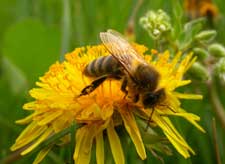Entomology
 http://www.ento.vt.edu http://www.ento.vt.edu
Loke T. Kok, Head
Professors: J. R. Bloomquist; R. D. Fell; D. A. Herbert, Jr.; L. T. Kok;
D.E. Mullins; D. G. Pfeiffer; S. M. Salom; P. B. Schultz; P. J. Semtner;
J. R. Voshell, Jr.; R. R. Youngman; M. J. Weaver
Associate Professors: J.C. Bergh; C. C. Brewster; T. P. Kuhar; D. M. Miller;
S. L. Paulson
Assistant Professors: Z. N. Adelman; K. M. Myles; I. V. Sharakhov
|
Overview
Entomology is both a basic and an applied science which deals with the study of insects and their effects upon the health, economy, and welfare of humankind.
The department offers graduate programs leading to the M.S.L.F.S. (thesis or non-thesis) and Ph.D. (see Graduate Catalog). The departmental teaching, research, and extension programs are closely coordinated with those of other departments. Insects are important as agricultural, health, and aesthetic pests and as beneficial organisms which serve as pollinators, biological control agents for pest populations, and as components of natural ecosystems. While entomologists have only scratched the surface in the study of insects and related arthropods, their research has yielded great benefits to humankind. Examples include reductions in human diseases transmitted by insects and the leadership shown by entomologists in the development of integrated pest management principles and procedures.
Undergraduate Course Descriptions (ENT)
2004: INSECTS AND HUMAN SOCIETY
An appreciation of the past, present and future role of insects with human society. Includes how to identify common insects and other arthropods, the effects of insects on human history; diseases transmitted by insects and their worldwide impact; insects and their influence on our language, literature, and the arts; management of pests of plants, animals, and its effects on environmental pollution; and practical information of how to recognize and manage important insects and arthropods, such as termites in houses and fleas on animals. (3H,3C) I,II,III,IV.
2254: BEES AND BEEKEEPING
An introduction to honey bee biology, the social organization of the honey bee colony and to modern apiculture, including the use of bees for pollination. Topics on beekeeping include equipment, how to get started, and colony management practices. (2H,2C) II.
2264: BEES AND BEEKEEPING LABORATORY
A laboratory course which examines the principles and practices of modern apiculture as they relate to honey bee biology. An emphasis is placed on students gaining practical field experience in modern management techniques. Co: 2254. (3L,1C) II.
2974: INDEPENDENT STUDY
Variable credit course.
2984: SPECIAL STUDY
Variable credit course.
3014 (BIOL 3014): INSECT BIOLOGY
Insect biology provides an introduction to the science of entomology. The course covers the diversity of insects, their biology and behavior, the importance of insects and insect control programs in agriculture, and the effects that insects have had on human history and culture. Laboratory (3024) is optional. I Pre: (BIOL 1005, BIOL 1006) or (BIOL 1105, BIOL 1106) or (BIOL 1205H, BIOL 1206H). (2H,2C)
3024 (BIOL 3024): INSECT BIOLOGY LABORATORY
Taxonomy and ecology of insects commonly encountered. Identification of all orders and many common families. Ecological attributes of each taxon, including food, habitat, life cycle, and behavior. An insect collection is required. I Pre: (BIOL 1005, BIOL 1006) or (BIOL 1105, BIOL 1106) or (BIOL 1205H, BIOL 1206H). Co: 3014. (3L,1C)
3254 (BIOL 3254): MEDICAL AND VETERINARY ENTOMOLOGY
An introduction to the roles of insects and other arthropods in the direct causation of disease in humans and animals, and as vectors in the transmission of disease organisms. The epidemiology and replication cycles of vector-borne pathogens with major medical and veterinary importance will be examined. Information will be provided on the biology and behavior of disease vectors and external parasites, and on the annoying and venomous pests of humans and animals. Mechanisms of control will be discussed Pre: (BIOL 1005, BIOL 1006) or (BIOL 1105, BIOL 1106) or (BIOL 1205H, BIOL 1206H). (3H,3C) II.
3264 (BIOL 3264): MEDICAL AND VETERINARY ENTOMOLOGY LABORATORY
Taxonomy and anatomy of insects and arthropods of medical and veterinary importance. Examination of feeding behavior and ecology. Emphasis on the mechanism of injury or pathogen transmission by each group. II. Pre: (BIOL 1105, BIOL 1106) or (BIOL 1005, BIOL 1006) or (BIOL 1205H, BIOL 1206H). Co: 3254. (3L,1C)
4254: INSECT PEST MANAGEMENT
Principles of insect pest management with application to the major insect pests found in Virginia. Pest management involves the utilization of all effective control practices in a program which is ecologically and economically efficient. This course is intended for all students with an interest in efficient agricultural production and in reducing losses to our most diverse competitor. One year of General Biology required. (2H,3L,3C) II.
4264 (PPWS 4264): PESTICIDE USAGE
An interdisciplinary study of pesticides used in urban and agricultural environments. Topics studied will include: classification, toxicology, formulation, application techniques, safety, legal considerations, environmental impact, and research and development of new pesticides. Pre: CHEM 2515 or CHEM 2536. (2H,3L,3C) II.
4354 (BIOL 4354): AQUATIC ENTOMOLOGY
Biology and taxonomy of insects and other macroinvertebrates most commonly encountered in freshwater environments. Selected aspects of biology, such as habitat, feeding, locomotion, and life history. Identification of individual taxa, mostly at family and genus level. Significance of these organism in aquatic ecology, pollution monitoring, and natural resource management. Pre: (BIOL 1005, BIOL 1006), (BIOL 1015, BIOL 1016) or (BIOL 1105, BIOL 1106, BIOL 1115, BIOL 1116). (3H,3L,4C)
4484 (BIOL 4484) (FIW 4484): FRESHWATER BIOMONITORING
Concepts and practices of using macroinvertebrates and fish to monitor the environmental health of freshwater ecosystems. Effects of different types of pollution and environmental stress on assemblages of organisms and underlying ecological principles. Role of biological studies in environmental regulation. Study design, field and laboratory methods, data analysis and interpretation, verbal and written presentation of results. Pre: (BIOL 2804), (BIOL 4004 or BIOL 4354 or ENT 4354 or FIW 4424 or FIW 4614). (3H,3L,4C)
4974: INDEPENDENT STUDY
Variable credit course.
4984: SPECIAL STUDY
Variable credit course.
4994: UNDERGRADUATE RESEARCH
Variable credit course.
TOP
|
 http://www.ento.vt.edu
http://www.ento.vt.edu